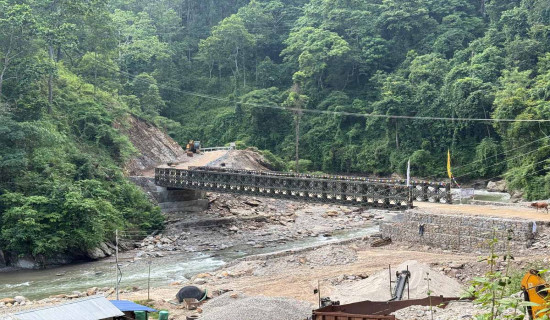- Saturday, 2 August 2025
Experiencing Japan’s Tradition And Innovation Up-close
I recently had an opportunity to visit Japan for a week through the JENESYS programme hosted by the Japan International Cooperation Centre (JICE). Before embarking on my journey, my curiosity about this advanced Asian nation was high. Japan, known for maintaining its development despite facing frequent disasters like earthquakes and tsunamis, heightened my interest. Additionally, I was keen to understand the growing appeal of Japan as an educational destination for Nepali students. With these curiosities and a sense of excitement, I commenced my trip to Japan, a nation celebrated for its unique blend of tradition and innovation, in mid-December.
Toilet marvel
My memorable experience in Japan started with a surprising encounter with their high-tech toilet. The country's commitment to innovative technology and dedication to cleanliness left a lasting impression on me. Upon arriving at Narita International Airport in Tokyo, I took a moment to freshen up in the restroom. The high-tech Japanese toilets there provided me with a delightful experience. Features such as heated seats, automatic water spray, warm water availability, and a built-in dryer showcased a high level of innovation. Beyond the technological advancement, the most noteworthy aspect of my experience was the cleanliness of public toilets in Japan. This standard of hygiene was not confined to airports but was consistently maintained across diverse settings, including hotels, restaurants, homestays, shopping malls, and railway stations. The fancy toilets I found everywhere in Japan showed how much they wanted everyone to have access to this cool technology. While using these technologically advanced toilets, a desire was sparked within me for the adoption of such innovative restroom technology in own country. Considering that the country is currently transitioning from open defecation to closed toilets, I couldn't help thinking about the feasibility of implementing such advanced technology. The wish for these advancements was made without recalling the current state of the country's sanitation infrastructure.
Punctual and disciplined
I noticed that Japanese were always on time and well-disciplined, leaving a strong impression on me. I met Japanese officials, who were punctual and organised. Throughout my visit, the disciplined behaviour of the citizens continued to influence my experience positively. The punctuality and orderliness I observed became defining aspects of my time in Japan. The organised waiting stations outside the airport and the subsequent comprehensive briefing about the programme underscored the Japanese commitment to punctuality and clarity. Clear instructions regarding the rules of our stay further strengthened the notion that punctuality and discipline are integral cultural values. From the beginning of activities to the ongoing proceedings, the officials ensured that each participant was well-informed and aware of the significance of being on time. The entire programme was started only in the presence of all participants, and there was an expectation for everyone to follow the schedule. The evidence of commitment to punctuality was the timely departure and arrival of trains and buses or an on-time programme.
One striking example of Japanese discipline is the strict adherence to seat belt usage. Japanese citizens not only wear seat belts themselves but also remind others to buckle up promptly. People throw their trash in the right bins and avoid littering, showing their dedication to a clean and orderly environment. This careful approach to garbage disposal highlights Japan's commitment to keeping its surroundings pristine. It's a testament to their strong emphasis on cleanliness and orderliness. Japan, despite having an ageing population, impressed me with the industriousness of its people. During our homestay, we witnessed the dedication of an elderly Japanese couple who not only managed their accommodation but efficiently handled logistics for a group, maintaining flawless hygiene standards. This exemplifies Japan's commitment to punctuality, discipline, and a robust work ethic, traits that persist even in the elderly population.
Technological advancements
Japan is a nation frequently grappling with natural disasters such as earthquakes, tsunamis, and typhoons. The nation’s proactive approach to disaster management, which involves advanced technology, early warning systems, and community education, has been minimising the human and economic toll of calamities. In Tokyo, the capital city, towering skyscrapers reaching up to the 50th floor showcased Japan's impressive engineering and commitment to earthquake resilience. Meanwhile, in the village of Nagano, traditional wooden houses also demonstrated strong resilience. Coming from a country that has experienced substantial human and material losses due to inadequate structural systems, I was impressed by Japan's technological advancements in creating structures that effectively withstand earthquakes.
The iconic Shinkansen, or bullet train, exemplifies Japan's technological prowess. With speeds reaching over 200 miles per hour, these trains are not just a mode of transportation but a symbol of efficiency and precision, even in mountainous areas. From the revolutionary Shinkansen and earthquake-resistant buildings to cutting-edge technological developments, Japan stands at the forefront of progress. The integration of technology is easily adjusted into daily life, as seen in the advanced toilet systems.
Preservation of culture
Japan takes pride in preserving its rich cultural heritage. Government initiatives play a crucial role in this regard. The participants were taken to a Nagano village for homestay. During my stay with a family in Japan, I loved how they followed their unique traditions. They were really kind and welcoming. The mix of their culture and their warm hospitality made my stay memorable. One distinctive aspect was the traditional Japanese sleeping arrangement, where a bed (futon) was offered on the floor.
One of the culinary highlights during my time in Japan was the variety of Japanese cuisine presented artistically. From traditional sushi to sashimi, each dish was crafted with precision and creativity. The use of fresh, high-quality ingredients was apparent. It was evident that the art of food presentation is deeply ingrained in Japanese food culture. The immersion into Japanese culture continued with engaging lessons on origami, a traditional art form of paper folding. During my time in Japan, they offered kimono, a traditional Japanese garment that carries profound cultural significance and is often worn on special occasions or celebrations. A unique cultural experience was the visit to a public bath, an integral part of Japanese daily life. The emphasis on communal bathing not only highlighted hygiene practices but also underlined the importance of shared spaces in fostering community bonds. The unique aspect was the absence of garments and bathing naked, a practice rooted in tradition during communal baths. Similarly, exploration of local museums further enriched my understanding of Japan's history. The vivid illustrations and artefacts provided insights into the nation's past, offering a glimpse into the cultural evolution and milestones that have shaped contemporary Japan.
Beyond cultural exploration, the host family's efforts to teach their language added a personal touch to the homestay experience. These efforts not only safeguard Japan's cultural identity but also provide an immersive experience for both locals and visitors. For these, the contribution of the Japanese government is very high.
Language barrier
Visiting Japan can be tricky, as not many people speak English, even in public places like malls. The language barrier can make it hard to ask even simple questions. Our group had a tough time and wasted about two hours because we couldn't use Google Maps on the street as we could not connect to the internet. We think Japan should find a way to make it easier for visitors, so they don't face these problems. Even though there's a language barrier and some difficulties, exploring a new culture feels like an exciting adventure. We hope Japan can make things better for international visitors by coming up with appropriate solutions. Despite the challenges, we still enjoyed discovering and learning about the new culture.
Nepali diaspora
The presence of Nepali people in Japan is particularly noticeable, with many actively involved in the restaurant business. Despite having a personal interest in connecting with them, their work schedule often hindered the opportunity for direct interactions with them. It is found that most restaurants, particularly those labelled as serving Indian foods, are operated by the Nepali community. I came across restaurants called Tara Kitchen, Asian Dining Lumbini, Indian Restaurant Tulasi during my visit.
Bhawan Bhatta, former president of NRNA (Non-Resident Nepali Association), said approximately 3,700 restaurants in Japan are operated by Nepalese. This development is seen as a source of economic prosperity for Nepalese living in Japan. Most of the restaurant workers are also Nepalese students. The business helps Nepalese in their economic growth.
Shraban Satyal, Tara Kitchen operator in Tokyo, said Nepalese are able to establish own business only after a long struggle there. He further said that Nepalese on student visas are find it challenging in Japan due to financial pressures from their families. Satyal advised parents not to have immediate expectations from their children studying in Japan. He pointed out that those who are willing to work hard and put in effort can still make progress in Japan.
I also met a Nepali in Tokyo who transitioned from a student visa to a work visa. Despite the higher income ratio in Japan compared to Nepal, she shared that the journey came with huge sacrifices. Currently employed at a Japanese hotel where accommodation is provided on the premises, she mentioned the challenges of being unable to access Nepali food for months, adjusting to Japanese cuisine for a long time as one of the toughest aspects of her experience. This sheds light on the complexities individuals face when pursuing opportunities abroad, underscoring the importance of adaptability in such situations.
Despite all challenges, the growing attraction of Japan to Nepali students is because it combines educational aspirations with the promise of prosperous career paths. Based on my observations, attractive job opportunities and growth in Japan have enticed Nepali students.
Japan-Nepal connectivity
Japan's expertise in various sectors can benefit less developed countries, addressing challenges and improving infrastructure. Nepal, with its mountainous terrain, could learn from Japan's bullet train system to enhance transportation. High-speed rail networks could efficiently connect cities and reduce travel times. Japan's success in waste management, particularly recycling and waste-to-energy initiatives, can be shared with SAARC countries like Nepal, where effective waste management ideas are sought.
Japan has been introducing many projects since the 2015 earthquakes in Nepal, which is appreciable. Even now, there can be collaboration in designing and implementing earthquake-resilient structures in Nepal. This can enhance preparedness and minimise the impact of disasters. Likewise, Japan can initiate educational programmes and workshops to share its technological knowledge and expertise with professionals and experts in the concerned area. As Japan has made advancements even in hydropower technology, it can collaborate with Nepal to develop efficient and sustainable hydroelectric projects. Establishing collaborative research projects between Japanese and SAARC institutions can facilitate the development of innovative solutions tailored to the specific needs of the region. Japan has been contributing to Nepal; it can be a better way if both sides contribute to this.
The journey to Japan exposed me to an interesting blend of tradition and modernity. Factors such as cleanliness, innovation, and punctuality, which are embodied in Japanese culture, left a deep impression on my mind. The progressive toilet technology, which symbolised the Japanese innovation pursuit, inspired a wish to emulate such innovations in my homeland. Collaboration and shared knowledge between Nepal and Japan can ensure further development as Japan continues to provide support for Nepal. This experience highlighted the importance of multicultural studies, showing how they can bring about positive changes.
It demonstrated how one nation's blend of tradition and technology can influence processes, fostering better relations between people from different countries. Overall, it underscored the diverse ways multicultural studies can contribute to global understanding and collaboration.
(The author is a journalist at The Rising Nepal .)



-original-thumb.jpg)
-square-thumb.jpg)












